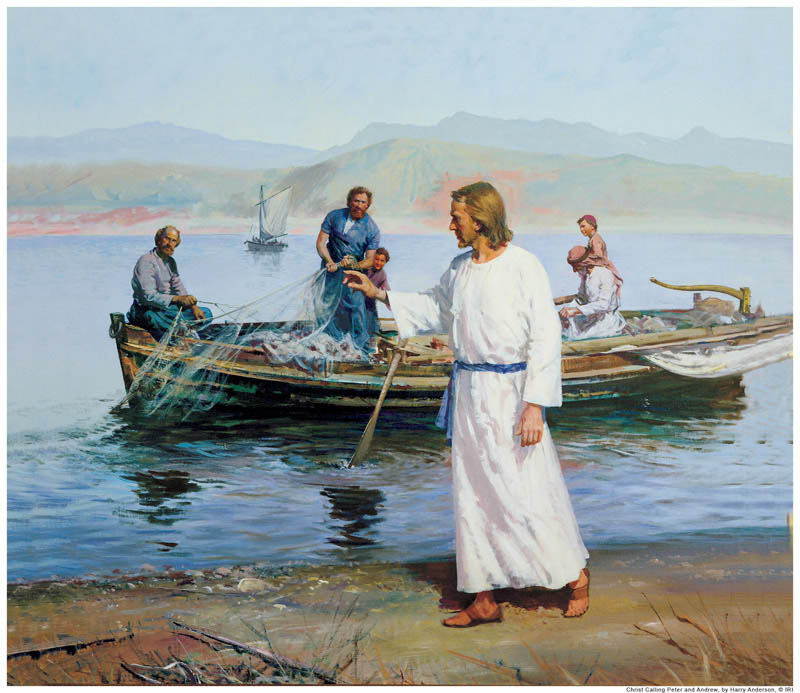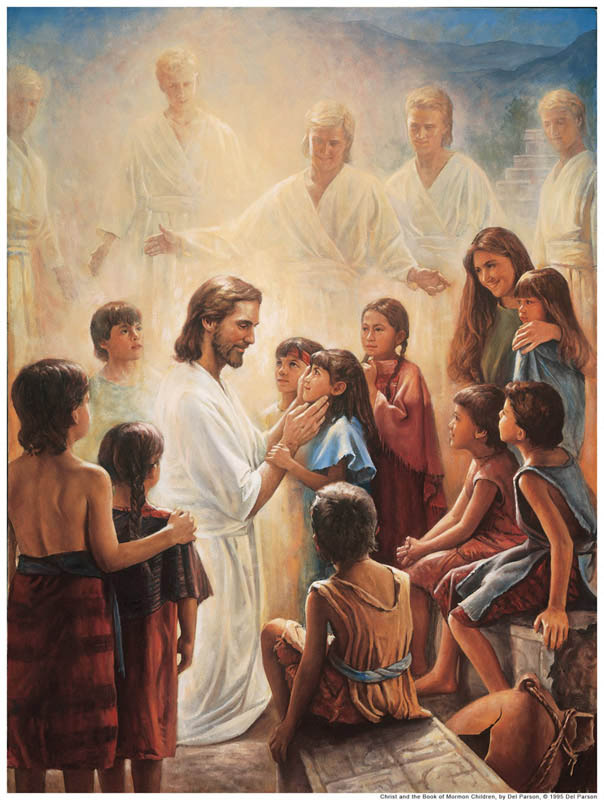Mormons use several volumes of scripture, including the Bible, the Book of Mormon, the Doctrine and Covenants, and the Pearl of Great Price. The Book of Mormon gave rise to the nickname often given Mormons, but the actual name of the religion is The Church of Jesus Christ of Latter-day Saints. The first part tells us whose church it is. In the Book of Mormon, Jesus explains that a church belongs to whoever it is named after, so His church must be named after him. The second part distinguishes the early Saints from those in the restored church today.
 Mormons study scripture on a four year rotation, with the Bible getting two years, the Book of Mormon one year, and Church history and Doctrine and Covenants one year. The Pearl of Great Price is included in other classes as appropriate.
Mormons study scripture on a four year rotation, with the Bible getting two years, the Book of Mormon one year, and Church history and Doctrine and Covenants one year. The Pearl of Great Price is included in other classes as appropriate.
Do Mormons believe in the Bible? Obviously, they do, since it is studied for two years in every four for adults, teens and older children, and every other year for the youngest children. Teens study it an additional two years (they are studying the Old Testament this year) in an early morning or release time class held on school days.
Bible Translation
Mormons believe the Bible is accurate as far as it is translated correctly. Some people get offended by this suggestion that as it appears in their copy it may not be perfect. However, the Bible was not written in English. Within the English language, it has been translated many times and these translations often vary dramatically. A popular parallel Bible website offers thirty versions just in English. Every language has its own translations. Mormons use the King James Bible in English.
If you’ve ever studied another language, you know there is no such thing as exact translation. Often words don’t have an exact translation or there may be multiple ways to translate the word. In addition, words change meanings over time. The meaning of a word today may not be what it meant at the time of the translation, so even if it was accurately translated at the time the work was done, readers can misunderstand the meaning. One reason Wycliffe, who first translated the Bible into English, was murdered is that the Catholic Church objected not just to the translation effort, but to some specific translations. They felt the translations changed the meanings of some verses and that these translations made some of their practices no longer Bible-sanctioned. There is more than one way to translate a verse, and the choices made matter in how you view doctrine. This is why so many Bibles now include the Greek and Hebrew and why many Christians decide to study those languages. They want to see for themselves what the verses really meant in the original languages. All the Biblical translations in print today are different and they can’t all be exactly accurate for that reason. To say it’s correct if it is translated correctly is only to recognize that many translations exist and that men are imperfect. These are things we all know.
How the Bible Came to Be
Few people actually understand how the Bible came to be. It was not written as a single book, handed down from generation to generation. There were many different records. It was long after Jesus died that the various scrolls were gathered up and a committee had to decide what to include and what to exclude. Not all churches agree on what should be included. The Catholic Bible has different books than the Protestant Bible, for instance. The choices were made by people, not by direct revelation from a current prophet, since there were no prophets at that time. To be certain, they were inspired people, as were the King James translators, but they were still people. Even the Book of Mormon, which was handed down as a single document and translated by a prophet, includes a disclaimer by the original authors that there may be man-made imperfections. People are not perfect. In addition, the books of the Bible were often written long after the events occurred. Adam did not write the Book of Genesis. Historians in those days did not function in the same manner as historians today. Their goal was to show the interactions between God and man, to help us understand our relationship to and our responsibility to God and Jesus Christ.
If you read the Bible carefully, you will note that Genesis has two versions of the creation. Chapters one and two both tell the story, but the stories don’t match. The order of creation is different. Does this make the Bible false? Of course not. The purpose of the Bible account of creation is to explain who made the earth and why. Those are doctrine. The rest is interesting, but not doctrine because it doesn’t impact our eternal salvation. The accounts are complimentary, but each is trying to make a different point, so the author told the story in a different way. Mormons do not accept that these types of details make the Bible false, nor do translation errors. As it was written by the original authors, it was a perfectly inspired document in everything that is important. Errors have crept in and some translations are more accurate than others, but if we read our Bible carefully and studiously, and if we pray to know the truth, we don’t need to concern ourselves too much with those errors or even with the disagreements over which books to accept. Mormons hold the Bible to be sacred scripture, although they often don’t treat it as absolutely literal—which a person cannot do if he is to accept both Genesis 1 and 2, for instance. However, they do consider the translators of the King James version highly qualified and very inspired.
Read a brief history of the King James Bible.
Missing Scriptures
Unfortunately, we don’t have a complete collection of the writings of ancient prophets. The Bible itself mentions several prophets for whom we have no record and of books the ancient people have that we do not. For instance, in 2 Chronicles 9, verse 29, we read:
“Now the rest of the acts of Solomon, first and last, are they not written in the book of Nathan the prophet, and in the prophecy of Ahijah the Shilonite, and in the visions of Iddo the seer against Jeroboam the son of Nebat?”
We don’t have Nathan’s book to refer to. According to this verse, we’re missing quite a bit about Solomon. A few chapters later, in chapter 13, verse 22, we see Iddo mentioned again:
“And the rest of the acts of Abijah, and his ways, and his sayings, are written in the story of the prophet Iddo.”
What valuable doctrine is missing because those books are gone? We are also missing the writings of Jehu and Enoch and a prophecy from Ahijah. More importantly, perhaps, we don’t have all the writings of Paul. Paul mentions in 1 Corinthians 5:9 that he had written an epistle we do not have. Mormons do not believe the Bible is all God ever intended us to have.
Is the Bible the Final Word of God?
Mormons don’t believe God has decided that now that Jesus has come, God refuses to speak to us again. He hasn’t turned His back on us, leaving us to flounder as we prepare for the Second Coming. In a world that is very different from the one in which the Bible was written, we need guidance and direction. The existence of so many churches demonstrates the need for a modern prophet who can help us understand how to apply today’s world to God’s teachings. If the Bible were all we needed to be completely sure of every doctrine, there would be only one denomination in all the world. Even within the Protestant tradition, there are serious disagreements over doctrine. Without a prophet, we are left to guess what is true. The Bible taught God’s word through His prophets and it assures us God will always send prophets. While it’s true that at times we have rejected prophets and we’ve had periods of apostasy, God has always reopened the heavens.
“Surely the Lord God will do nothing, but he revealeth his secret unto his servants the prophets (Amos 3:7). Mormons don’t believe God is doing nothing today, so He must be talking to prophets.
A more important reference on this subject is Ephesians 2:19-20:
19 Now therefore ye are no more strangers and foreigners, but fellowcitizens with the saints, and of the household of God;
20 And are built upon the foundation of the apostles and prophets, Jesus Christ himself being the chief corner stone;
This reference tells us God’s church must be built on a foundation of prophets and apostles, something few churches even claim to have today. The cornerstone must be Jesus Christ, who set the example for us by choosing apostles to assist him as witnesses of Christ.
Some have said Jesus was the last prophet. However, the Bible suggests prophecy continued for a time after Jesus died:
And Judas and Silas, being prophets also themselves, exhorted the brethren with many words, and confirmed them (Acts 15:32).
God loves us and He understands how complicated today’s world is. He provided prophets in Biblical times to give guidance specific to the time period in which each prophet lived, as well as for today. Now, He continues to send prophets to help us navigate the last days. The idea of continuing revelation in no way reduces the impact of the Bible, any more than having Moses be called as a prophet lessens the importance of Noah’s time as a prophet. It is simply one more proof of God’s continuing love for all His children, not just those who lived anciently. Additional scriptures, such as the Book of Mormon, should be welcomed with joy as further proof of the divinity of Jesus Christ. Now we know it wasn’t just one little group of people who saw Jesus and thought He was divine. His appearance to another group of people—after His death—is the essential second witness of the divinity of Jesus Christ. Christians should celebrate this additional testimony.
About Terrie Lynn Bittner
The late Terrie Lynn Bittner—beloved wife, mother, grandmother, and friend—was the author of two homeschooling books and numerous articles, including several that appeared in Latter-day Saint magazines. She became a member of the Church at the age of 17 and began sharing her faith online in 1992.





